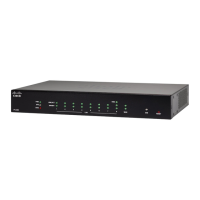CHAPTER 7
Wireless
A Wireless Local Area Network (WLAN) is a wireless distribution method that implements a flexible data
communication system using high-frequency radio waves and often includes an access point to the Internet.
This is achieved by augmenting, rather than replacing a wired LAN within a building or campus. Since the
WLANs use radio frequency to transmit and receive data, they don't require a wired connections. This allows
users to move around the coverage area, and still maintain a network connection.
This section describes the WLAN, which is a type of local-area network that uses high-frequency radio waves
rather than wires to communicate between nodes and contains the following topics:
• Basic Settings, on page 63
• Advanced Settings, on page 67
• WPS, on page 68
• Captive Portal, on page 69
• Lobby Ambassador, on page 70
Basic Settings
The device provides Wireless LAN (WLAN), with all ports (LAN and WLAN) on single broadcast domain.
The router supports 802.11ac standard and concurrent dual-band selection at 2.4 and 5 GHz. Depending on
the radio, you can select the frequency or channel for WLAN network data transmission and reception.
Selecting the appropriate channel width for each radio can improve the WLAN throughput.
On the Basic Settings page, you can add, edit, or delete the wireless SSID settings, and select and configure
the radio channels. You can add up to four separate virtual wireless networks per Radio. In other words, you
cannot add more than eight SSIDs (that is, four SSIDs per radio); the Add button is grayed out when you
reach this limit.
To configure the Wireless SSID settings, follow these steps:
Step 1 Select Wireless > Basic Settings.
Step 2 Under the Wireless Table, click Add or Edit and configure the following.
Specify the name of the network.SSID Name
Check Enable to enable the network.Enable
RV260x Administration Guide
63

